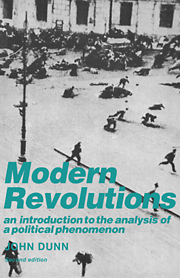Book contents
- Frontmatter
- Contents
- Preface to the first edition
- Introduction to the second edition
- Introduction: the ideological dilemmas of moden revolution and its analysts
- 1 Russia
- 2 Mexico
- 3 China
- 4 Yugoslavia
- 5 Vietnam
- 6 Algeria
- 7 Turkey
- 8 Cuba
- Conclusion: approaches to the ideological assessment and causal explanation of modern revolutions
- Notes
- Bibliography: guide to further reading
- Supplementary reading, 1971–88
- Index
- Frontmatter
- Contents
- Preface to the first edition
- Introduction to the second edition
- Introduction: the ideological dilemmas of moden revolution and its analysts
- 1 Russia
- 2 Mexico
- 3 China
- 4 Yugoslavia
- 5 Vietnam
- 6 Algeria
- 7 Turkey
- 8 Cuba
- Conclusion: approaches to the ideological assessment and causal explanation of modern revolutions
- Notes
- Bibliography: guide to further reading
- Supplementary reading, 1971–88
- Index
Summary
In terms of the numbers of human beings which it involved – and perhaps ultimately in terms of its significance for mankind at large – the Chinese revolution has been the greatest so far of all the revolutions of the twentieth century. It began – as did the Russian revolution – within the structures of an autocratic empire toying with the idea of introducing representative institutions into its governmental structure and, unlike the Russian revolution, it required a vast and long-drawn out military struggle for the revolutionaries to acquire power. Unlike the Russian revolution, also, it is still even now very far from having ended. It began in humiliation more extreme than anything that the history of Russia can show and the way in which it developed throughout was heavily affected by the struggle to escape from this humiliation. The Chinese revolution was supremely a nationalist revolution, a revolution in which highly civilized elites set themselves to vindicate the battered pride of a great civilization and in the end in part succeeded in doing so. But it was also a social revolution, a revolution not merely made possible but actually carried out by and for the peasantry and, although it was directed by its leaders to exorcising the shame of national impotence, it did not produce, as the Mexican revolution appears to have done, a society divided sharply into a peasantry with its face resolutely set towards the past and the perpetuation of its communal traditions (partly because of the comparative weakness of communal traditions in China) and an industrial sector following the capitalist way but keeping a determined eye on its national independence.
- Type
- Chapter
- Information
- Modern RevolutionsAn Introduction to the Analysis of a Political Phenomenon, pp. 70 - 95Publisher: Cambridge University PressPrint publication year: 1989



